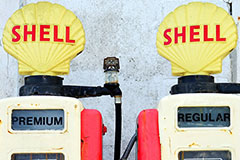Regular vs. High-Octane Gasoline - Vol.389
The octane rating is a number assigned in accordance with fuel performance. In the case of car engines, low octane fuel is generally enough to prevent knocking. An 87 octane rating gasoline is the most popular choice for most motorists and the minimum required rating for most engines.

One of the most common misconceptions when it comes to fuel is that high-octane gasoline will give your car extra horsepower. While there are differences between regular and premium gasoline, using a higher octane is not always as beneficial as you might think.
Costs
The price of gasoline is always subject to change. That being said, regular gasoline will always be cheaper than premium gasoline. Many people choose it in order to save a few bucks but they don't stop to wonder about the long-term effects.
All engines are designed to run on a specific minimum octane. When filling up the tank it's best that you do it with the closest one available. If your car is designed for 93 octane minimum, choosing 91 may not be optimum but it is much less likely to cause engine knocking than 87 octane gasoline (more on this later).
It's important to understand that regular or lower octane gasoline is not synonymous with low-quality fuel, although premium gasoline usually contains extra additives useful in certain situations. For most commercial vehicles, 87 is actually the owner's manual's recommendation. So, there is no reason to upgrade the gasoline to a higher number if the design of the engine doesn't call for it.
Efficiency
Contrary to popular belief premium gasoline won't turn your minivan into a race car. What premium gasoline does differently than regular gasoline is that it can withstand higher pressure before auto ignition. High-powered engines operate at higher compression ratio which is why cars with more powerful engines usually require higher octane. High-octane gasoline is more stable under pressure but it will not make your engine more powerful.
Using Higher Octane than Recommended
Using premium gasoline is sometimes a popular choice among owners of old car models. If you're in this category, here's how premium fuel can actually save you some cash. Older engines have their octane rating raised due to carbon deposits that accumulate over the years. This creates the need for fuel that can withstand a higher pressure.
Because of this running regular gasoline is not sufficient anymore, if you want to prevent knocking (pinging). Premium gasoline is more stable under pressure and also has additives that can help clean the fuel system. So, instead of buying a new car right away, you could squeeze a few more miles out of the old one at the cost of paying more for fuel.
Using Lower Octane than Recommended
In the long run, you won't actually save any money. If anything, using regular gasoline where premium is recommended can severely damage your engine. For one, your car's performance drops because the engine is not built to efficiently burn a lower octane fuel.
Secondly, using the wrong octane is the primary cause of engine knocking. Knocking, or pre-detonation is caused by auto ignition of lower octane gas when operating at higher compression ratio or pressure than it is designed for. It can overheat your engine and even end up melting pistons. This doesn't happen immediately but it can happen after prolonged use of lower octane gas than recommended.
Conclusion
If you hear a metallic pinging noise coming from the engine you might be using the wrong gasoline in your car. Checking the manufacturer's manual may save you a trip to the shop.
At the same time, spending extra for premium if your engine doesn't need it won't increase its performance.
In conclusion, there's really no upside to using a cheaper or more expensive gasoline than recommended.